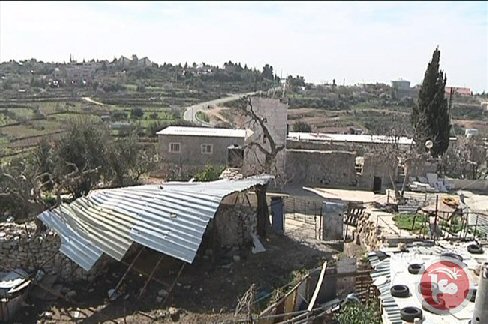Israeli forces on Wednesday delivered a demolition order for a Palestinian agricultural structure located inside of the Gush Etzion settlement bloc, local officials said.Head of the Khallet Sakariya village council, Muhammad Ibrahim Atallah, told Ma’an News Agency that Israeli forces issued the order to demolish a 60-meter-square metal structure used as a sheep barn.
The barn belongs to Muhammad Ahmad Ismail.
A month ago, Israeli forces delivered two demolition orders to Tayseer Muhammad Ahmad Saad and Khalil Muhammad Mahmoud Saad for their homes.
Over 30 residents in the small village have received demolition warrants, Atallah said, adding that villagers are gradually leaving because Israel’s military forces do not allow any new construction.
Around 150 villagers have left since 2007, with the population now standing at 500.
Khallet Sakariya is located in the center of Israel’s Gush Etzion bloc adjacent to the Jewish-only settlement of Rosh Zurim.
Around 2,000 dunams of the total area of 9,000 has been confiscated by military forces, Atallah added.
Also on Wednesday, Israeli forces blocked off all entrances leading to the town of Taqou, east of Bethlehem, preventing residents movement in and out of the area, according to a local official.
Head of the town’s municipality, Taysir Abu Mfreh, informed WAFA that Israeli forces deployed and set up surprise flying checkpoints at all entrances leading to the town, preventing residents’ movement.
B’Tselem, the Israeli Information Center for Human Rights in the occupied Palestinian Territories, said in a report, “Israel’s restrictions on Palestinians’ freedom of movement in the West Bank are enforced by a system of fixed checkpoints, surprise flying checkpoints, physical obstructions, roads on which Palestinians are forbidden to travel, and gates along the Separation Barrier. The restrictions enable Israel to control Palestinian movement throughout the West Bank as suits its interests, in a sweeping breach of Palestinians’ rights.”
It said that, “Prolonged checks and searches at some of the checkpoints, humiliating treatment by soldiers, and long lines deter Palestinian drivers from using some of the roads still open to their use. As a result, Palestinian movement on some of the main roads in the West Bank has decreased, and these roads are used almost exclusively by settlers.”
B’Tselem said that in February 2014 there were 99 fixed checkpoints in the West Bank: 59 are internal checkpoints, located well within the West Bank.
Meanwhile, Israeli forces attacked school students in the early morning hours, spurring confrontations with residents; forces fired tear gas bombs and stun grenades towards residents, however, no injuries were reported.
Search IMEMC: ‘Israeli Settlement’

